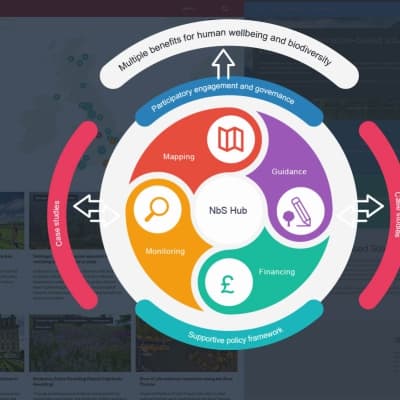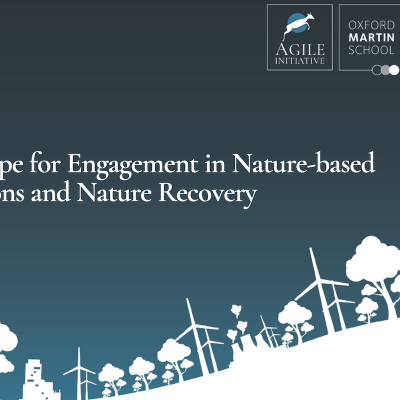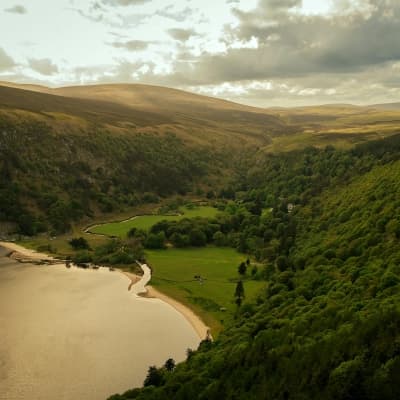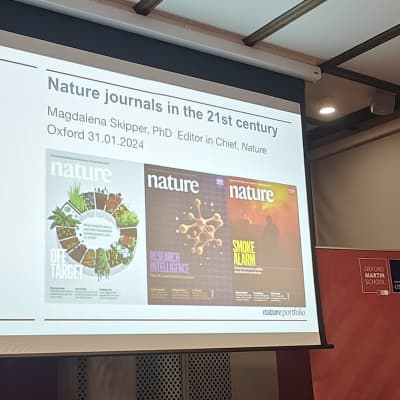Filter by
749 results found
-

Monitoring and reporting outcomes of Nature-based Solutions projects
In a world where accurate measurement of project outcomes is crucial - from biodiversity to carbon storage - we need frameworks, tools, and protocols to ensure accurate, robust, and repeatable monitoring. -

Join Us for the 2024 NbS Conference: Growing Positive Change
The programme for our Nature-based Solutions Conference 2024, with the theme of "Growing Positive Change," is now live! -

The Flourishing Landscapes Programme
The Flourishing Landscapes Programme (FLP) addresses the triple challenge of livelihoods, climate change, and biodiversity loss at tropical forest frontiers. FLP focuses on landscapes with agricultural land-use dominated, to varying extents by, by coffee or cocoa production. -

Collaboration for Nature: Launch of UK NbS Knowledge Hub
With the aim of overcoming key challenges and barriers to scaling up high-quality nature-based solutions in the UK, the Knowledge Hub offers stakeholders, including practitioners, local land management bodies, and policymakers, guidance on implementing NbS projects based on the latest science and best practices. -

TNFD at Davos Highlights Critical Role of Indigenous Communities in Biodiversity Conservation
At the annual World Economic Forum (WEF) held in Davos, the Taskforce on Nature-related Financial Disclosures (TNFD) gave a call to action for the inclusion of Indigenous Peoples and Local Communities (IPLCs) in shaping the emerging biodiversity market. -

Unlocking the Power of Engagement for Nature Recovery and Nature-based Solutions
Recently, Dr. Caitlin Hafferty hosted a free webinar for practitioners called the Unlocking the power of engagement for Nature Recovery and Nature-based Solutions, supported by the Leverhulme Centre for Nature Recovery and the Agile Initiative. -

Biden-Harris Administration expand use of Nature-Based Solutions to Protect Communities
The Biden-Harris focus on a nature-based solutions strategy sets a precedent for global action and demonstrates the transformative potential of nature-based approaches to tackle societal challenges such as climate change. -

Navigating the Complexity of Forest Landscape Restoration: Beyond Tree Planting
In the endeavour to restore degraded landscapes, the focus often turns to planting trees as a solution. However, a complexity lies in the potential misclassification of ecosystems and the potential unintended consequences of well-meaning restoration efforts. -

New evidence that nature-based solutions can support economic recovery in Peru
A new report by the Nature-based Solutions Initiative Peru provides evidence for the role of nature-based solutions in supporting post-pandemic economic recovery, alongside a diversity of environmental and social benefits. -

Relying on large-scale Carbon Dioxide Removal risks damaging the Biosphere
The recent news that global average temperature has surpassed 1.5°C underscores the urgent need for swift action in reducing greenhouse gas emissions, rather than placing undue faith in risky technologies. -

5th Open Science Meeting “Pathways to Sustainable and Just Land Systems”
In this session, we will explore some of the conceptual and practical tools that can enable more holistic evaluation, addressing multiple sustainability criteria, and highlight case-studies of multi-criteria assessment methods that can contribute to achieving and monitoring genuinely sustainable land-use. -

Scientists warn of Threat to Pantanal Wetlands
A new study by over 40 scientists has raised concerns over potential degradation of the Pantanal - the world's largest wetland - if the Brazilian government proceed with a proposed commercial waterway project. -

Ireland adopts Holistic Approach to Biodiversity
A recent publication of the fourth National Biodiversity Action Plan (NBAP) for Ireland, backed by statutory powers, signals a critical turning point in the country's approach to nature conservation. -

Nature Journal: Past, Present and Future
Research in the 21st century is increasingly complex, data-rich, and multidisciplinary. It increasingly finds itself under a spotlight. Nature and the other Nature Portfolio Journals have evolved to showcase the robustness and transparency of research, as well as its increasingly inclusive, cross-sector and multi-stakeholder focus. -

Major research investment into UK land use transformation
A new Land Use for Net Zero Hub has been awarded £6.25 million by UK Research and Innovation (UKRI), to help drive land transformations needed to achieve Net Zero by 2050. -

Poster Applications now Open for NbS Conference 2024
Find out more about our Nature-based Solutions Conference 2024, to be held at Oxford University Museum of Natural History this summer, from 18th – 20th June. -

Comment on forthcoming changes to Environmental Land Management schemes
Researchers John Lynch and Alison Smith comment on, DEFRA's updated Agricultural Transition Plan, which outlines changes to agricultural policy. -

Treading Lightly: Policy Implications of the Restated Evidence on Grazing Livestock and Soil Carbon
Some claim that enough carbon can be stored in pastures to balance all other emissions from livestock production, whilst others state that the carbon storage potential is minimal and easily reversed. -

Collaboration for a Thriving Planet: NbSI joins forces with the Oxford Smith School
The Nature-based Solutions Initiative has partnered with the Smith School of Enterprise and the Environment, with Professor Nathalie Seddon now leading her interdisciplinary team under both the Smith School (in the Department of Geography) and the Department of Biology. -

We must Scale-up Action to meet Nature Targets in England
The Government is largely off-track to meet its legally binding environmental targets in England, and action must be speeded up and scaled up, according to a progress report by the Office for Environmental Protection (OEP). -

Exciting new leadership role as Deputy Director of the NbSI
We are looking to appoint a Senior Researcher and Deputy Director in Nature-based Solutions as part of a new collaboration between the Biology and the Smith School of Enterprise and the Environment. -

Welcome to our January NbS Foundation Course Scholars
We warmly welcome our scholars, who join a diverse cohort of participants from all over the world for our January 2024 executive education course on nature-based solutions. -

A restatement of the natural science evidence base concerning grassland management, grazing livestock and soil carbon storage
This paper describes a project that set out to summarise the natural science evidence base relevant to grassland management, grazing livestock and soil carbon storage potential in as policy-neutral terms as possible. -

Considering the Cross-Boundary Environmental and Social Implications of the EU’s Carbon Dioxide Removal Strategy in Brazil
This book is a core output from the Horizon Europe project SSH CENTRE: Social Sciences and Humanities for Climate, Energy and Trans- port Research Excellence that includes findings from novel interdisciplinary collaborations which were catalysed and funded by the project. -

Webinar: Nature-Based Solutions and their Socio-Economic Benefits for Peru
"Nature-Based Solutions and their Socio-Economic Benefits for Peru": Results Presentation and Report Release Event
